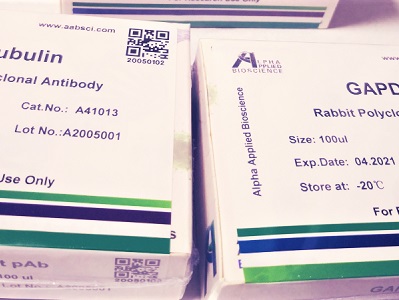

ROM-K rabbit pAb
Cat :A20989
-
Source
Rabbit
-
Applications
IF,ELISA
-
Reactivity
Human,Mouse,Rat
-
Dilution
IF: 1:200 - 1:1000. ELISA: 1:10000. Not yet tested in other applications.
-
Storage
-20°C/1 year
-
Specificity
ROM-K Polyclonal Antibody detects endogenous levels of ROM-K protein.
-
Source/Purification
The antibody was affinity-purified from rabbit antiserum by affinity-chromatography using epitope-specific immunogen.
-
Immunogen
The antiserum was produced against synthesized peptide derived from human ROMK/Kir1.1. AA range:11-60
-
Uniprot No
P48048
-
Alternative names
KCNJ1; ROMK1; ATP-sensitive inward rectifier potassium channel 1; ATP-regulated potassium channel ROM-K; Inward rectifier K(+) channel Kir1.1; Potassium channel; inwardly rectifying subfamily J member 1
-
Form
Liquid in PBS containing 50% glycerol, 0.5% BSA and 0.02% sodium azide.
-
Clonality
Polyclonal
-
Isotype
IgG
-
Background
potassium voltage-gated channel subfamily J member 1(KCNJ1) Homo sapiens Potassium channels are present in most mammalian cells, where they participate in a wide range of physiologic responses. The protein encoded by this gene is an integral membrane protein and inward-rectifier type potassium channel. It is activated by internal ATP and probably plays an important role in potassium homeostasis. The encoded protein has a greater tendency to allow potassium to flow into a cell rather than out of a cell. Mutations in this gene have been associated with antenatal Bartter syndrome, which is characterized by salt wasting, hypokalemic alkalosis, hypercalciuria, and low blood pressure. Multiple transcript variants encoding different isoforms have been found for this gene. [provided by RefSeq, Jul 2008],
-
Other
KCNJ1, ATP-sensitive inward rectifier potassium channel 1
-
Mol.Wt (Da)
44795
-
Concentration
1 mg/ml
| Product | Reactivity | Applications | Conjugation | Catalog | Images |
|---|
-
 400-836-3211
400-836-3211
-
 support@aabsci.com
support@aabsci.com
-
β-actin rabbit pAb ...... >
-
β-actin rabbit pAb(A284) ...... >
-
Plant-actin rabbit pAb ...... >
-
β-tubulin mouse mAb(M7) ...... >
-
GAPDH mouse mAb(2B8) ...... >
-
GAPDH mouse mAb(PT0325) ...... >
-
Histone H3 rabbit pAb ...... >
-
Histone H3 rabbit pAb ...... >
-
COX IV mouse mAb(6C8) ...... >
-
GFP-Tag mouse mAb(1G6) ...... >
-
HA-Tag mouse mAb(1B10) ...... >
-
mCherry-Tag mouse mAb(6B3) ...... >










 400-836-3211
400-836-3211
